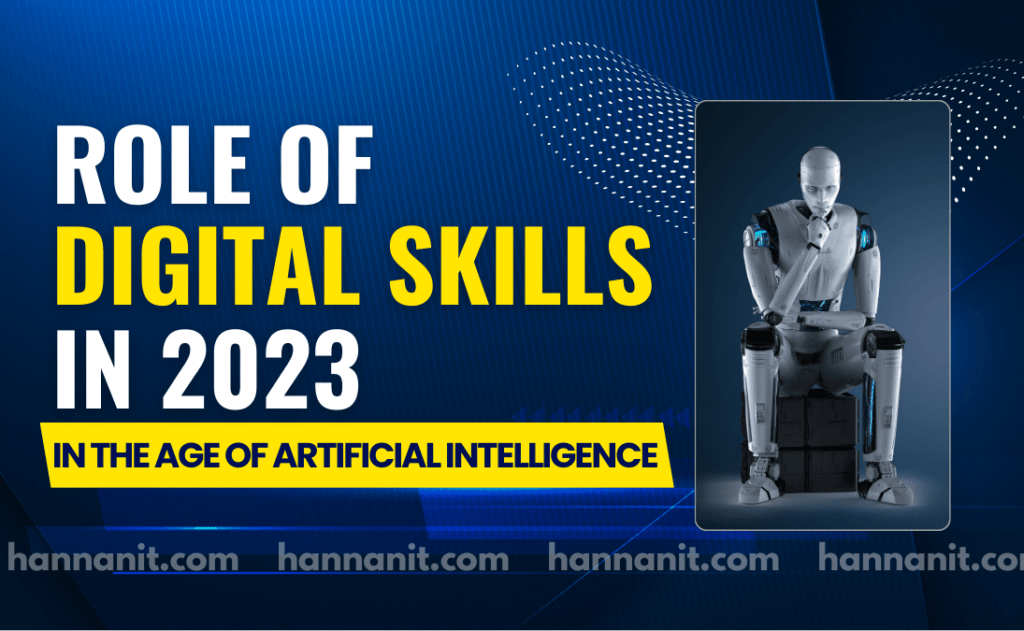I. Digital Skills in Artificial Intelligence
Artificial Intelligence (AI) has become a major driving force in the modern world, transforming industries and reshaping the way we live and work. As AI continues to develop and become more pervasive, digital skills are increasingly important. This blog post will explore the role of digital skills in the age of AI, discussing their impact on the job market, their relevance, and the importance of training and development.
II. What are digital skills?
Digital skills refer to the ability to use digital technology, communication tools, and networks to access, manage, and create digital content. These skills can be divided into three categories:
A. Basic digital skills
These are the foundational skills required to use digital devices, software, and online platforms. Examples include using email, browsing the internet, and creating documents.
B. Intermediate digital skills
Intermediate skills build on the basics and involve more complex tasks. Examples include using spreadsheets, editing images, and creating simple websites.
C. Advanced digital skills
Advanced digital skills require specialized knowledge and expertise. Examples include programming, data analysis, and digital marketing.
III. The impact of AI on the job market
A. AI and job automation
AI has the potential to automate a wide range of tasks, increasing efficiency and productivity. However, this also means some jobs may become obsolete or require fewer human workers.
B. Job displacement and creation
While some jobs may be displaced by AI, new opportunities will also be created. Digital skills will play a crucial role in helping individuals adapt to these changes and remain competitive in the job market.
C. The importance of digital skills in the job market
Having digital skills, particularly in AI and related technologies, can increase job prospects and open up new career opportunities.
IV. The relevance of digital skills in Artificial Intelligence
A. Need for digital skills in AI
Digital skills are essential for working with AI, as they enable individuals to understand, develop, and implement AI technologies.
B. Role of digital skills in the development and implementation of AI
Digital skills can contribute to the design, creation, and maintenance of AI systems, as well as their integration into various industries and applications.
C. Opportunities created by digital skills in Artificial Intelligence
Proficiency in digital skills can lead to new career paths and opportunities in the AI sector, such as AI development, data analysis, and AI consultancy.
V. Digital skills and future-proofing
A. Explanation of future-proofing
Future-proofing involves preparing for and adapting to changes in the job market and technological landscape, ensuring long-term career success.
B. Importance of future-proofing in the AI age
In the age of AI, future-proofing is crucial, as rapid technological advancements and market shifts can quickly render skills and jobs obsolete.
C. How digital skills can future-proof careers
Developing digital skills, especially those related to AI, can help individuals stay relevant and in-demand in the job market, even as technology evolves.
VI. Digital skills training and development
A. Importance of digital skills training
Continuous learning and upskilling are essential for maintaining and expanding digital skills, as well as staying competitive in the job market.
B. Types of digital skills training
There are several ways to acquire digital skills, including:
• Formal education and training • Online learning and certification • On-the-job training
C. Resources for digital skills training
Numerous resources are available for digital skills development, including online courses, workshops, and tutorials.
VII. Challenges in developing digital skills in Artificial Intelligence
A. Challenges in digital skills development
Developing digital skills can be challenging due to the rapid pace of technological change and the diverse range of skills
required. Additionally, a lack of access to resources, time constraints, and financial barriers can make it difficult for individuals to acquire the necessary skills.
B. Ways to overcome challenges
To overcome these challenges, several strategies can be employed:
- Collaboration between government, private sector, and education: Working together, these entities can create programs and initiatives that support digital skills development.
- Development of effective policies and programs: Governments can design policies that encourage digital skills training and provide funding for educational institutions and training programs.
- Innovation and research: Investing in research and development can help identify new technologies and methods for delivering digital skills training more effectively and efficiently.
VIII. Conclusion
In conclusion, digital skills play a crucial role in the age of AI, impacting the job market, creating new opportunities, and helping individuals future-proof their careers. Continuous learning and skill development are essential to staying competitive in this rapidly evolving landscape. To overcome the challenges in developing digital skills, collaboration between various sectors, effective policies, and innovation are key. By embracing digital skills and adapting to the ever-changing world of AI, individuals can pave the way for a successful and fulfilling career.
FAQs
Digital skills refer to the ability to use digital technology, communication tools, and networks to access, manage, and create digital content.
Digital skills are essential for working with AI technologies and staying competitive in the job market, as they enable individuals to understand, develop, and implement AI systems.
Digital skills can be acquired through various methods, including formal education and training, online learning and certification, and on-the-job training.
Challenges in developing digital skills include the rapid pace of technological change, diverse skill requirements, lack of access to resources, time constraints, and financial barriers.
Overcoming challenges in developing digital skills can be achieved through collaboration between government, private sector, and education, the development of effective policies and programs, and investing in innovation and research.
Basic digital skills include using email, browsing the internet, and creating documents. Intermediate digital skills involve using spreadsheets, editing images, and creating simple websites. Advanced digital skills require specialized knowledge and expertise, such as programming, data analysis, and digital marketing.
AI has the potential to automate various tasks, increasing efficiency and productivity, which may lead to some jobs becoming obsolete or requiring fewer human workers. However, AI can also create new opportunities that require digital skills, such as AI development, data analysis, and AI consultancy.
Future-proofing involves preparing for and adapting to changes in the job market and technological landscape to ensure long-term career success. In the age of AI, future-proofing is crucial, as rapid technological advancements and market shifts can quickly render skills and jobs obsolete. Developing digital skills, especially those related to AI, can help individuals stay relevant and in-demand in the job market.
Resources for digital skills training include online courses, workshops, and tutorials from platforms such as Coursera, edX, Udemy, LinkedIn Learning, and Khan Academy. Additionally, some universities, colleges, and professional organizations offer specialized courses and certifications in digital skills.
Governments can create policies that encourage digital skills training, provide funding for educational institutions and training programs, and invest in research and development. The private sector can collaborate with educational institutions to develop industry-relevant curricula, offer on-the-job training opportunities, and invest in employee training programs. Both sectors can work together to create initiatives that support digital skills development for the wider population.



